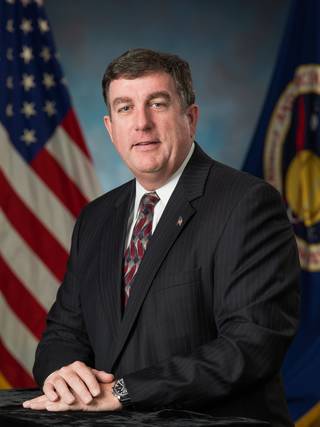NASA Names Acting International Space Station Program Manager
Kathy Lueders, NASA’s associate administrator for Human Exploration and Operations, has named Joel Montalbano as acting manager of the International Space Station Program. The appointment is effective Friday, June 26, the date Kirk Shireman, who has been in the position since 2015, is retiring from the agency to take a position in private industry.
“Kirk has dedicated 35 years of his career advancing and improving human spaceflight, and doing it in a collaborative way,” said Lueders. “The relationships he has fostered within NASA, and with our international and commercial partners, have made the International Space Station a model for the incredible achievements possible through global cooperation. I thank Kirk for his service to America’s space program. I am confident Joel’s leadership of this program will continue to expand the role of the space station as a national asset for exploration, science, and commercial use.”
Montalbano has served as deputy program manager since 2012. Kenneth Todd will continue as deputy program manager.
Prior to becoming deputy program manager, Montalbano was the director of NASA’s Human Space Flight Program in Russia from 2008 to 2012. He was a NASA flight director from 2000 to 2008. Montalbano began his career at NASA in January 1989, after earning a bachelor’s degree in aerospace, aeronautical and astronautical engineering from Iowa State University, in Ames, Iowa.
Montalbano has earned multiple NASA awards, including the Distinguished Service and Exceptional Service medals. He also was awarded the Astronauts’ Silver Snoopy Award and the American Astronomical Society’s Advancement of International Cooperation Award.
“The International Space Station is a cornerstone of world human spaceflight, forging global partnerships and proving that permanent human residency in space is possible,” said Mark Geyer, director of NASA’s Johnson Space Center in Houston, which is home to the space station program office. “Kirk’s leadership has been instrumental in those achievements. His service to NASA has guided the station to mark 20 years of permanent occupation this year. We wish him well.”
Shireman has been program manager since 2015, during which time the space station expanded its role as a unique microgravity laboratory, hosting more than 2,800 research investigations from researchers in 108 countries and areas, and returning benefits to Americans on Earth through its role as the an official U.S. national laboratory. During his tenure, the program broadened support for commercial and marketing opportunities, private astronaut missions, commercial modules and in-space manufacturing to enable a robust low-Earth orbit economy. Under his leadership, NASA partners SpaceX and Northrop Grumman completed more than 30 commercial resupply missions, and SpaceX launched the first commercial crew test flight to the station. Shireman joined NASA in 1985.
“It has been the honor of a lifetime to have worked through the development of the International Space Station from a fledgling facility to a world-class laboratory,” Shireman said. “The International Space Station will continue to expand and thrive in the years ahead, laying the groundwork for future explorers moving forward to the Moon, improving life on Earth, and opening up low-Earth orbit commercial activity and growing a robust economy there. These fantastic, dedicated people together with our international partners have been the highlight of my professional career. I truly believe ISS has earned a place in history as the most complex human engineering achievement of all time.”
For almost 20 years, humans have lived and worked continuously aboard the International Space Station, advancing scientific knowledge and demonstrating new technologies, making research breakthroughs not possible on Earth that will enable long-duration human and robotic exploration into deep space. Under this unique international partnership, 239 people from 19 countries have visited the station.

